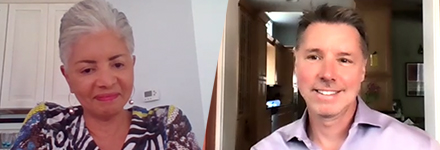
In celebration of Pride month, William Blair hosted an inspirational conversation on June 9 with Mark Ishaug, a Chicago and national LGBTQ leader and advocate for the rights of vulnerable populations.
As the CEO of Thresholds, one the largest and oldest mental health providers in Illinois, Ishaug believes respect, empathy, transparency, and most of all … love is necessary to help others. Thresholds provides healthcare, housing, and hope for thousands of adults and youth suffering from mental illness and substance abuse. Most are coming from the state’s poorest communities.
“If love wasn’t part of the mix, I couldn’t do what I do at work—it would be too hard,” Ishaug says.
The LGBTQ community has been disproportionately impacted by mental health challenges, especially LGBTQ youth which have higher rates of suicidal ideation than non-LGBTQ youth, he says. Alcohol and drug abuse are also higher in the LGBTQ community. This is related to structural inequality, to stigma, to people being told by their families they are not normal.
And certainly in black and brown neighborhoods, including the black and brown LGBTQ community, there is disproportionate access to mental and physical healthcare, Ishaug adds.
“We are still trying to pass laws in this country that create equal access to mental health treatment that should have the same co-pays, the same deductibles that one is able to get in the physical healthcare space,” he says.
Journey to Lead Social Reform
Before joining Thresholds in 2012, Ishaug worked as a leader in the fight against HIV/AIDS as CEO of AIDS United and earlier as the head of AIDS Foundation of Chicago.
His life journey to lead social justice reform and equity for all regardless of color, gender, ethnicities, began as a kid growing up in an all-white neighborhood of southwest Chicago during the Civil Rights Movement of the 1960s. His mother was a community organizer fighting against redlining—the discriminatory practice that prevented blacks from getting conventional home loans.
Ishaug was living across the street from where Dr. Martin Luther King Jr. was attacked by an angry crowd while leading protestors against unfair housing practices in August 1966. After the protest, Chicago adopted an agreement to make open housing a reality.
Those early lessons, and with the support of his parents, made coming of age and coming out easier for Ishuag to live and lead the authentic life he wanted.
“I don’t take that for granted,” he says. “I want to use this privilege that I have as an out, gay, authentic, married man—to use that power and privilege to make sure laws and systems are designed going forward everywhere to protect us.
“We can’t really address and solve the mental health crisis in this country until we address, in my opinion, economic equity, gender equity, and certainly racial equity.”
Ishaug says he’s inspired by the words of political activists, including those of well-known academic Dr. Cornel West: “‘Never forget that justice is what love looks like in public.’”


